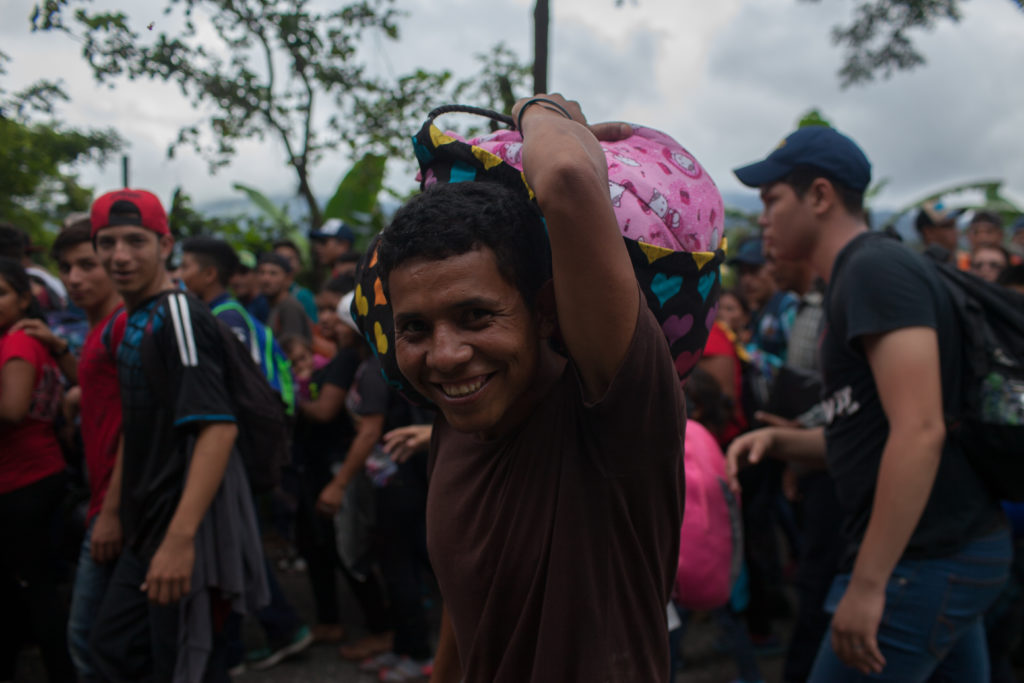by BETH GEGLIA
 A man carries his belongings on his shoulder as the second caravan of migrants leaves Esquipulas, Guatemala on October 21 in hopes of reaching the United States. PHOTO/Jeff Abbott
A man carries his belongings on his shoulder as the second caravan of migrants leaves Esquipulas, Guatemala on October 21 in hopes of reaching the United States. PHOTO/Jeff Abbott
I remember sitting across the table from my friend Pavel in a coffee shop in Tegucigalpa in 2014. The conversation was casual and frank, as it often is, when talking to Hondurans about the imminent possibility of death. “The worst thing is that I know I could die in the dumbest way. It’ll happen while I’m leaving the grocery store, walking out of a coffee shop, or driving to band practice.” Pavel was a well-known musician and activist. His rock band had led an important role in denouncing the 2009 military coup in Honduras and reaching popular audiences about themes of poverty and structural inequality. Following a series of unidentified attacks against family members and band-mates, he was convinced that the government could, and would likely, have him killed at any time.
“The other day I was talking to a friend of mine from elementary school who was in a special elite unit the military for a while,” he said with a nervous, smile. “I asked him, ‘if they wanted to come into my home and kill me, is there any way I could prevent it?’ ‘No,’ he told me. ‘None.’ I asked, ‘but I’m talking like I have two dogs and gate and an alarm system, and…’ ‘No, if they want to do it, there’s nothing you can do,’” his friend had assured him.
That conversation in 2014 marked the beginning of my field research in Honduras as a doctoral candidate in Anthropology. During my fieldwork, which would last close to two years, I would have countless conversations like this one with Honduran men and women contemplating the possibility of their own death, or worse, that of their family members. Pavel was lucky. He eventually fled Honduras and received political asylum in Europe, but not before suffering serious mental health issues that led to repeated institutionalizations during the time I knew him. The post-coup crisis had given him “nervios” (nervousness, or anxiety) which was sometimes visible in his shaky hands and fidgety body as he talked about hoping to one day see a change in the city and country that he loved so much.
“Everyone here is like a ticking time bomb,” another friend in Tegucigalpa often told me. “We are all suffering psychologically but we don’t say anything. The things we experience every day, there is no escape from it.” These words reverberate through my head as I read the news today. “There is no escape from it.”
As I read the news, I’m also reminded of the moment I learned why my friend Victor slept in a hammock in front of his house. It was March 3, 2016, and I was in the southern region of Honduras, on a peninsula called Zacate Grande, studying land dispossession in rural communities. I had been woken up at 7am that morning to the news that the beloved Honduran social leader Berta Cáceres had been assassinated inside her home the night before. As the sleepy fishing village of La Pintadillera hummed gently with its morning activities, Victor left his radio streaming the news from Radio Progresso, as he did every morning, listening this time with solemn silence. “Bertita” had been a beloved ally to the struggle for land in the entire peninsula of Zacate Grande, and had helped establish their community radio station, La Voz de Zacate Grande, years prior.
Victor’s wife Gloria choked back tears over breakfast as her six-year-old daughter listened in, “I will never forget the day we celebrated the first anniversary of the radio. Berta was here. She drove us back from Playa Grande.” That day, Gloria said, the military stopped a group of local musicians on their way home from the festivities on the side of the road, detained them, beating some. Word of the attack made it back to Playa Grande. “I was so scared to go back but it was late and my kids had to sleep,” she told me. “Berta said ‘let’s go,’ and she drove. When we encountered the military on the road, Berta said ‘get those kids on the floor in case they start shooting at us.’ I was panicking, thinking, ‘oh my god, what if they shoot my child?’ but Berta knew what to do. She saved our lives.”
“We will keep doing this work, but we know they can kill us at any moment,” Victor told me the morning of Berta’s death. Then he asked me if I knew why he slept outside at night.
I had noticed before that Victor, a man facing death threats for his involvement in a community association dedicated in part to combating land grabbing and the privatization of local beaches by the country’s economic elite, had taken to sleeping in front of his house. I had assumed it was an act of defiance. Certainly, it was cooler to sleep in the fresh air and perhaps Victor was sending a message to his adversaries that he was not afraid.
“Look at how they killed Berta in her home,” he told me. “You know that I sleep in a bed with my wife and kids. Imagine if they came in looking for me and found us all there. Imagine if they came in shooting, and…” His voice trailed off before he could continue.
Toward Freedom for more
